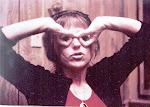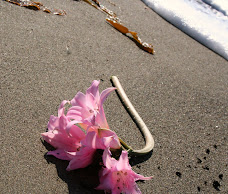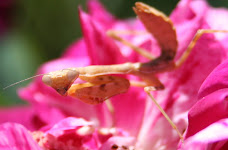
It’s funny how your parents get smarter after you’ve left home and become a parent yourself.
My young adult daughter believes I was a personal friend of the dinosaurs. I believe she needs my input more than ever. This disparity often drives me to my own mother for advice.
At 78 and shrinking, Mom is a gnome of a lady who can’t walk without pain and a cane. For most of my life she was a busy Norwegian in blue jeans who knew more about hardware than many men, strong and wiry, an expert in an arcane craft: handmade cooler pads.
Now confined to an assisted-living home, her insights are edged with mercy, a quality I think we all could use more of. I wish my daughter would sit at her grandmother’s feet and learn a little there.
But alas! The young are too busy making their own mistakes to value the wisdom of the old, who have made theirs already and grown wiser for it. Someday my daughter might wish to know what her grandmother knew about life, and it will be too late.
So I took my pen and paper and sat at my mother’s knee. What do we need to do to be happy? I asked. She laughed. Seriously, I said. For a few minutes, she communed with the oak tree arching over our heads, and then she dropped five pearls in my lap.
Have a smile for everyone!
I took my mother to a craft fair recently. Something in a booth caught our eyes, so we wandered that way and handled the merchandise. Her exclamations of pleasure and enthusiasm drew others to the stall, and Mom exclaimed over their beautiful eyes, their wonderful sweaters, their lovely hair. She had to hug them all.
In this way we made our slow way around the room. Women approached her and asked, “Will you come to my booth? You’re a people magnet, and I need business at my stall.”
On the drive home, Mom heaved a great sigh. “What a wonderful time!” she said. That is the consequence of a smile.

Listen to children and nature.
Mom can’t get out into the world under her own steam anymore, but she’s busy watching it from her windows, which overlook a field on one side and busy family street on the other.
Listening to children at play, she says, gives you an insight into what they’re thinking. Children innately forgive and forget. Listen to the congregation at the monkey bars, and your faith in the future of mankind might be restored.
Observing the world at her doorstep provides a daily ration of food for the soul, claims my mother. Emerson said the sky is the daily bread of the eyes. Mom is a little more down to earth. “It’s thrilling to hear the songs of birds, the breeze rustling the leaves,” she says. “It means I’m still alive!”
Take care of what you have.
Ordinary things, well cared for, become the treasures of your children’s children. My mother points to a well-used pitcher on a shelf. “It was my mother’s,” she explains. “It’s not valuable, but I like to look at it and remember the iced tea she made on hot days.”
If we are forever replacing with the new, she wonders, what chance have our children to make such sentimental attachments to our simple, well-used things?
It is not only things. This same woman insisted, when we were young campers in national forests, that we police our campsites before leaving. “Leave it better than we found it,” she’d say, to our annoyance. Today, when we pull into sites littered with human laziness, I wish all campers followed her rules.
The work of a person’s hands also matters to this woman, who drilled her children in their chores. Paraphrasing Lord Chesterfield without knowing it— “Any job worth doing is worth doing well!”—she would demonstrate the proper way to push a broom or clean a surface.
Imagine a world in which people cared for their environment, possessions, towns and children with that dictum foremost in their minds!
Put the best construction on everything.
One day I stood at the sink scrubbing furiously on an old Revere ware pot my husband had burned dry when he got sidetracked by the dogs. I was furious because it had been a wedding gift to my mother, passed down to me. I wished to confront my spouse with this sin against my heritage.
Mom sat at the counter, so I bemoaned the pot’s fate to her.
“Oh, that old kettle!” she laughed. “Just cook in it! It will be fine!”
My mother, the guru. As Ben Franklin said, “Any fool can criticize, condemn, and complain, and most fools do.”
The Eighth Commandment teaches us how to live at peace in a community: by bridling our tongues. My mother, a good Lutheran, quotes Martin Luther’s explanation of this command, which boils down to viewing your neighbor with kind eyes. This way mercy lies, and tolerance, and harmony with others.

Give your time to others.
“The best way to enrich your life,” Mom says, “is to give your time to people.”
Teddy Roosevelt, a president she admires, once declared, “Do what you can with what you have where you are.” My mother takes this to heart—literally.
“I have universal blood!” says this proud blood donor, who has traveled painfully by walker in these later years to donate her pints of O.
No longer able to function with advancing dementia, my mother makes quilts for people in distress. She helps a local nonprofit agency prepare mailings. She makes lists of organizations that need volunteers, in the event that she suddenly can work again. I find this heroic.
“The unselfish effort to bring cheer to others,” said Helen Keller, another hero, “will be the beginning of a happier life for ourselves. … Believe, when you are most unhappy, that there is something for you to do in the world. So long as you can sweeten another’s pain, life is not in vain.”
My young adult daughter believes I was a personal friend of the dinosaurs. I believe she needs my input more than ever. This disparity often drives me to my own mother for advice.
At 78 and shrinking, Mom is a gnome of a lady who can’t walk without pain and a cane. For most of my life she was a busy Norwegian in blue jeans who knew more about hardware than many men, strong and wiry, an expert in an arcane craft: handmade cooler pads.
Now confined to an assisted-living home, her insights are edged with mercy, a quality I think we all could use more of. I wish my daughter would sit at her grandmother’s feet and learn a little there.
But alas! The young are too busy making their own mistakes to value the wisdom of the old, who have made theirs already and grown wiser for it. Someday my daughter might wish to know what her grandmother knew about life, and it will be too late.
So I took my pen and paper and sat at my mother’s knee. What do we need to do to be happy? I asked. She laughed. Seriously, I said. For a few minutes, she communed with the oak tree arching over our heads, and then she dropped five pearls in my lap.
Have a smile for everyone!
I took my mother to a craft fair recently. Something in a booth caught our eyes, so we wandered that way and handled the merchandise. Her exclamations of pleasure and enthusiasm drew others to the stall, and Mom exclaimed over their beautiful eyes, their wonderful sweaters, their lovely hair. She had to hug them all.
In this way we made our slow way around the room. Women approached her and asked, “Will you come to my booth? You’re a people magnet, and I need business at my stall.”
On the drive home, Mom heaved a great sigh. “What a wonderful time!” she said. That is the consequence of a smile.

Listen to children and nature.
Mom can’t get out into the world under her own steam anymore, but she’s busy watching it from her windows, which overlook a field on one side and busy family street on the other.
Listening to children at play, she says, gives you an insight into what they’re thinking. Children innately forgive and forget. Listen to the congregation at the monkey bars, and your faith in the future of mankind might be restored.
Observing the world at her doorstep provides a daily ration of food for the soul, claims my mother. Emerson said the sky is the daily bread of the eyes. Mom is a little more down to earth. “It’s thrilling to hear the songs of birds, the breeze rustling the leaves,” she says. “It means I’m still alive!”
Take care of what you have.
Ordinary things, well cared for, become the treasures of your children’s children. My mother points to a well-used pitcher on a shelf. “It was my mother’s,” she explains. “It’s not valuable, but I like to look at it and remember the iced tea she made on hot days.”
If we are forever replacing with the new, she wonders, what chance have our children to make such sentimental attachments to our simple, well-used things?
It is not only things. This same woman insisted, when we were young campers in national forests, that we police our campsites before leaving. “Leave it better than we found it,” she’d say, to our annoyance. Today, when we pull into sites littered with human laziness, I wish all campers followed her rules.
The work of a person’s hands also matters to this woman, who drilled her children in their chores. Paraphrasing Lord Chesterfield without knowing it— “Any job worth doing is worth doing well!”—she would demonstrate the proper way to push a broom or clean a surface.
Imagine a world in which people cared for their environment, possessions, towns and children with that dictum foremost in their minds!
Put the best construction on everything.
One day I stood at the sink scrubbing furiously on an old Revere ware pot my husband had burned dry when he got sidetracked by the dogs. I was furious because it had been a wedding gift to my mother, passed down to me. I wished to confront my spouse with this sin against my heritage.
Mom sat at the counter, so I bemoaned the pot’s fate to her.
“Oh, that old kettle!” she laughed. “Just cook in it! It will be fine!”
My mother, the guru. As Ben Franklin said, “Any fool can criticize, condemn, and complain, and most fools do.”
The Eighth Commandment teaches us how to live at peace in a community: by bridling our tongues. My mother, a good Lutheran, quotes Martin Luther’s explanation of this command, which boils down to viewing your neighbor with kind eyes. This way mercy lies, and tolerance, and harmony with others.

Give your time to others.
“The best way to enrich your life,” Mom says, “is to give your time to people.”
Teddy Roosevelt, a president she admires, once declared, “Do what you can with what you have where you are.” My mother takes this to heart—literally.
“I have universal blood!” says this proud blood donor, who has traveled painfully by walker in these later years to donate her pints of O.
No longer able to function with advancing dementia, my mother makes quilts for people in distress. She helps a local nonprofit agency prepare mailings. She makes lists of organizations that need volunteers, in the event that she suddenly can work again. I find this heroic.
“The unselfish effort to bring cheer to others,” said Helen Keller, another hero, “will be the beginning of a happier life for ourselves. … Believe, when you are most unhappy, that there is something for you to do in the world. So long as you can sweeten another’s pain, life is not in vain.”
Chris Alba (c) 2009





11 comments:
Your mother sounds like someone I would love to know. You are so blessed to have her!
This is most precious. What great pearls indeed.
Your mother is a wise and wonderful woman. Just reading this today helped brighten my spirits, even though I was reading it through tears. I have always learned something from elderly people. Their wisdom is something I treasure. Thanks for this post.
Thank you for telling me how blessed I m to have her for a mother. It is something I pray a lot about: being grateful for my mother. The dementia is taking her away from me, and the roles have switched. I have lost the mother I treasured, but gained a new mother who is very sweet and childlike. I am going to get her now and take her to Starbucks. That always tickles her pink. Thank you for your comments. They are appreciated.
What a wonderful role model for you and for your adult children! I am in exactly the same position with my own mother - finding myself mothering her more than she does me these days. My mother was one of the smartest and sassiest people I knew; now she is some sweet little old lady. I really wish I had my mother back, but I know how blessed I am to still have her at all. Let's enjoy our blessings, Chris. They'll be gone oh, too soon.
This was a beautiful tribute.
I was just going to bed and read this post. Thank you so much. What wonderful wisdom to sleep on tonight! My mother died young, only 60, too young for me to really appreciate the good things about her. Only now have I really begun to understand her. jeNN
such is the wisdom gained only with time. thank you for sharing them. and your line about your daughter being to busy making her own mistakes, i think we can all relate to too. great post!
So EO it sounds like mom gave you the family jewels, crown jewels at that.
I read your comments and feel heartened by them. Our trip to Starbucks ended with her going ballistic, a side I haven't seen before. The disease advances. I feel like deleting this oh-so-cheery post. Sadness sucks.
Thanks for saying she made a little difference for a while.
Love,
Chris
Oh, Chris....
I read this post with tears in my eyes. My mom died at 55...a year younger than I am now. There are days when I feel grateful not to have to go through this stuff you're encountering, as I've watched many of my friends have to do. But mostly, I miss not having a mom for so many years. Especially since I sobered up and could have had a better relationship with her.
Thanks for this beautiful post....
xoxoxoAnnie
I'm sure you know that not every older person has such wisdom...some don't....I pray that I do if I am gifted with old age.
Post a Comment